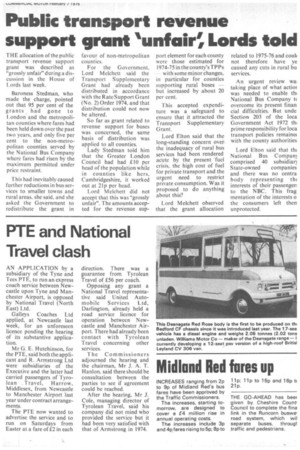Public transport revenue support grant 'unfair', Lords told
Page 27

If you've noticed an error in this article please click here to report it so we can fix it.
THE allocation of the public transport revenue support grant was described as "grossly unfair" during a discussion in the House of Lords last week.
Baroness Stedman, who made the charge, pointed out that 95 per cent of the grants _ had gone to London and the metropolitan counties where fares had been held down over the past two years, and only five per cent to the non-metropolitan counties served by the National Bus Company where fares had risen by the maximum permitted under price restraint.
This had inevitably caused further reductions in bus services to smaller towns and rural areas, she said, and she asked the Government to redistribute the grant in favour of non-metropolitan counties.
For the Government, Lord Melchett said the Transport Supplementary Grant had already been distributed in accordance with the Rate Support Grant (No. 2) Order 1974, and that distribution could not now be altered.
So far as grant related to revenue support for buses was concerned, the same basis of distribution was applied to all counties.
Lady Stedman told him that the Greater London Council had had £10 per head of the population while in counties like hers, Cambridgeshire, it worked out at 21p per head.
Lord Melchett did not accept that this was "grossly unfair". The amounts accepted for the revenue sup port element for each county were those estimated for 1974-75 in the county's TPPs with some minor changes. in particular for counties supporting rural buses — but increased by about 20 per cent.
This accepted expenditure was a safeguard to ensure that it attracted the Transport Supplementary Grant.
Lord Elton said that the long-standing concern over the inadequacy of rural bus services had been rendered acute by the present 'fuel crisis, the high cost of fuel for private transport and the urgent need to restrict private consumption. Was it proposed to do anything about this?
Lord Melchett observed that the grant allocation
related to 1975-76 and coulc not therefore have ye caused any cuts in rural bu services.
An urgent review wa: taking place of what actior was needed to enable ths National Bus Company tc overcome its present finan cial difficulties. But unde Section. 203 of the loca Government Act 1972 thi prime responsibility for loca transport policies remainec with the county authorities Lord Elton said that tht National Bus Compam comprised 40 subsidiar3 State-owned companies and there was no centra body representing th( interests of their passenger to the NBC. This frag mentation of the interests o the consumers left then unprotected.












































































































































